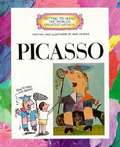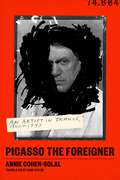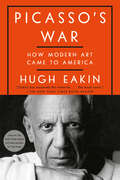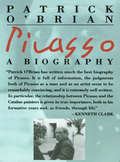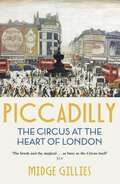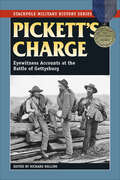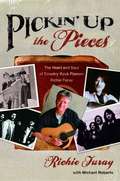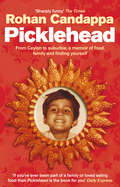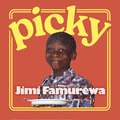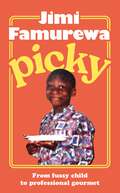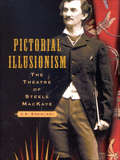- Table View
- List View
Piano Starts Here: The Young Art Tatum
by Robert A. ParkerRegardless of whether they've heard of jazz or Art Tatum, young readers will appreciate how Parker uses simple, lyrical storytelling and colorful and energetic ink-and-wash illustrations to show the world as young Art Tatum might have seen it. Tatum came from modest beginnings and was nearly blind, but his passion for the piano and his acute memory for any sound that he heard drove him to become a virtuoso who was revered by both classical and jazz pianists alike. Included in the back matter is a biography and bibliography.
Piano Starts Here: The Young Art Tatum
by Robert Andrew ParkerRegardless of whether they've heard of jazz or Art Tatum, young readers will appreciate how Parker uses simple, lyrical storytelling and colorful and energetic ink-and-wash illustrations to show the world as young Art Tatum might have seen it. Tatum came from modest beginnings and was nearly blind, but his passion for the piano and his acute memory for any sound that he heard drove him to become a virtuoso who was revered by both classical and jazz pianists alike. Included in the back matter is a biography and bibliography.<P><P> Winner of the Schneider Family Book Award
Piazza: Catcher, Slugger, Icon, Star
by Greg W. PrinceA franchise and fan base in perpetual search of validation finally had its ticket punched as 2016 dawned. Mike Piazza, who held records in one hand and a city’s rapt attention in the other, gained election to the Hall of Fame. Within weeks of this long-awaited announcement, the ballclub with whom he chose to cast his eternal lot, the New York Mets, made a date to retire his number.In Piazza: Catcher, Slugger, Icon, Star, Greg W. Prince-cocreator of Faith and Fear in Flushing, "the blog for Mets fans who like to read,” and author of Amazin’ Again, the story of the 2015 National League champions-explores the parallel paths Piazza and the Mets set out on in the early 1990s and how their individual journeys merged into a mutual quest for transcendence. From marriage of convenience to lifetime bond to a state of baseball grace reached only once before in team history, Piazza examines how the stranger from Los Angeles became New York’s favorite son and why Mets fans continued to rally to Piazza’s cause years after he took his final swing for them.
Piazzolla. El mal entendido
by Diego Fischerman Abel GilbertPiazzolla. El mal entendido es la biografía definitiva de uno de los compositores de tango más importantes del mundo. La vida y la obra de Astor Piazzolla transcurrieron entre su demonización y el asombrado reconocimiento. Fue el emblema sonoro de una ciudad que buscaba estar a tono con su tiempo y sus aspiraciones. A un siglo de su nacimiento, esta nueva edición de Piazzolla. El mal entendido recupera la trama artística, cultural y política que acompañó al bandoneonista desde su aparición fulgurante junto a Aníbal Troilo hasta su inserción internacional más allá del tango. El ensayo intenta ser un puente crítico de acercamiento a una música que no deja de abrirse a nuevos sentidos y reflexiones. "Este libro siempre ha tratado de ser un puente (uno más) con aquello que nos legó Piazzolla, un modo reflexivo de acercamiento a lo que, primero, llegó como una vibración: el aire de Buenos Aires en movimiento", dicen Fischerman y Gilbert.
Picasso
by Gertrude SteinFor more than a generation, Gertrude Stein's Paris home at 27 rue de Fleurus was the center of a glittering coterie of artists and writers, one of whom was Pablo Picasso. In this intimate and revealing memoir, Stein tells us much about the great man (and herself) and offers many insights into the life and art of the 20th century's greatest painter.Mixing biological fact with artistic and aesthetic comments, she limns a unique portrait of Picasso as a founder of Cubism, an intimate of Appollinaire, Max Jacob, Braque, Derain, and others, and a genius driven by a ceaseless quest to convey his vision of the 20th century. We learn, for example, of the importance of his native Spain in shaping Picasso's approach to art; of the influence of calligraphy and African sculpture; of his profound struggle to remain true to his own vision; of the overriding need to empty himself of the forms and ideas that welled up within him.Stein's close relationship with Picasso furnishes her with a unique vantage point in composing this perceptive and provocative reminiscence. It will delight any admirer of Picasso or Gertrude Stein; it is indispensable to an understanding of modern art.
Picasso (Getting to Know the World's Greatest Artists)
by Mike VeneziaBriefly examines the life and work of the renowned twentieth-century artist, describing and giving examples from his various periods or styles.
Picasso and the Painting That Shocked the World
by Miles J. UngerOne of The Christian Science Monitor&’s Best Nonfiction Books of 2018 &“An engrossing read…a historically and psychologically rich account of the young Picasso and his coteries in Barcelona and Paris&” (The Washington Post) and how he achieved his breakthrough and revolutionized modern art through his masterpiece, Les Demoiselles d&’Avignon.In 1900, eighteen-year-old Pablo Picasso journeyed from Barcelona to Paris, the glittering capital of the art world. For the next several years he endured poverty and neglect before emerging as the leader of a bohemian band of painters, sculptors, and poets. Here he met his first true love and enjoyed his first taste of fame. Decades later Picasso would look back on these years as the happiest of his long life. Recognition came first from the avant-garde, then from daring collectors like Leo and Gertrude Stein. In 1907, Picasso began the vast, disturbing masterpiece known as Les Demoiselles d&’Avignon. Inspired by the painting of Paul Cézanne and the inventions of African and tribal sculpture, Picasso created a work that captured the disorienting experience of modernity itself. The painting proved so shocking that even his friends assumed he&’d gone mad, but over the months and years it exerted an ever greater fascination on the most advanced painters and sculptors, ultimately laying the foundation for the most innovative century in the history of art. In Picasso and the Painting That Shocked the World, Miles J. Unger &“combines the personal story of Picasso&’s early years in Paris—his friendships, his romances, his great ambition, his fears—with the larger story of modernism and the avant-garde&” (The Christian Science Monitor). This is the story of an artistic genius with a singular creative gift. It is &“riveting…This engrossing book chronicles with precision and enthusiasm a painting with lasting impact in today&’s art world&” (Publishers Weekly, starred review), all of it played out against the backdrop of the world&’s most captivating city.
Picasso the Foreigner: An Artist in France, 1900-1973
by Annie Cohen-Solal"Absorbing [and] astute . . . Cohen-Solal captures a facet of Picasso’s character long overlooked." —Hamilton Cain, The Wall Street Journal"A beguiling read, as ingenious as it is ambitious . . . See Picasso and Paris shimmering with new light." —Mark Braude, author of Kiki Man Ray: Art, Love, and Rivalry in 1920s ParisBorn from her probing inquiry into Picasso's odyssey in France, which inspired a museum exhibition of the same name, historian Annie-Cohen Solal’s Picasso the Foreigner presents a bold new understanding of the artist’s career and his relationship with the country he called home.Winner of the 2021 Prix Femina EssaiBefore Picasso became Picasso—the iconic artist now celebrated as one of France’s leading figures—he was constantly surveilled by the police. Amidst political tensions in the spring of 1901, he was flagged as an anarchist by the security services—the first of many entries in what would become an extensive case file. Though he soon became the leader of the cubist avant-garde, and became increasingly wealthy as his reputation grew worldwide, Picasso’s art was largely excluded from public collections in France for the next four decades. The genius who conceived Guernica as a visceral statement against fascism in 1937 was even denied French citizenship three years later, on the eve of the Nazi occupation. In a country where the police and the conservative Académie des Beaux-Arts represented two major pillars of the establishment at the time, Picasso faced a triple stigma—as a foreigner, a political radical, and an avant-garde artist.Picasso the Foreigner approaches the artist’s career and work from an entirely new angle, making extensive use of fascinating and long-understudied archival sources. In this groundbreaking narrative, Picasso emerges as an artist ahead of his time not only aesthetically but politically, one who ignored national modes in favor of contemporary cosmopolitan forms. Cohen-Solal reveals how, in a period encompassing the brutality of World War I, the Nazi occupation, and Cold War rivalries, Picasso strategized and fought to preserve his agency, eventually leaving Paris for good in 1955. He chose the south over the north, the provinces over the capital, and craftspeople over academicians, while simultaneously achieving widespread fame. The artist never became a citizen of France, yet he enriched and dynamized its culture like few other figures in the country’s history. This book, for the first time, explains how.Includes color images
Picasso's War: How Modern Art Came to America
by Hugh EakinA riveting story of how dueling ambitions and the power of prodigy made America the cultural center of the world—and Picasso the most famous artist alive—in the shadow of World War II&“[Eakin] has mastered this material. . . . The book soars.&”—The New York Times Book Review (Editors&’ Choice)ONE OF THE BEST BOOKS OF THE YEAR: Vanity Fair, The New York Times Book Review, The New YorkerIn January 1939, Pablo Picasso was renowned in Europe but disdained by many in the United States. One year later, Americans across the country were clamoring to see his art. How did the controversial leader of the Paris avant-garde break through to the heart of American culture?The answer begins a generation earlier, when a renegade Irish American lawyer named John Quinn set out to build the greatest collection of Picassos in existence. His dream of a museum to house them died with him, until it was rediscovered by Alfred H. Barr, Jr., a cultural visionary who, at the age of twenty-seven, became the director of New York&’s new Museum of Modern Art.Barr and Quinn&’s shared goal would be thwarted in the years to come—by popular hostility, by the Depression, by Parisian intrigues, and by Picasso himself. It would take Hitler&’s campaign against Jews and modern art, and Barr&’s fraught alliance with Paul Rosenberg, Picasso&’s persecuted dealer, to get Picasso&’s most important paintings out of Europe. Mounted in the shadow of war, the groundbreaking exhibition Picasso: Forty Years of His Art would launch Picasso in America, define MoMA as we know it, and shift the focus of the art world from Paris to New York.Picasso&’s War is the never-before-told story about how a single exhibition, a decade in the making, irrevocably changed American taste, and in doing so saved dozens of the twentieth century&’s most enduring artworks from the Nazis. Through a deft combination of new scholarship and vivid storytelling, Hugh Eakin shows how two men and their obsession with Picasso changed the art world forever.
Picasso: A Biography
by Patrick O'Brian"The best biography of Picasso."--Kenneth Clark Patrick O'Brian's outstanding biography of Picasso is here available in paperback for the first time. It is the most comprehensive yet written, and the only biography fully to appreciate the distinctly Mediterranean origins of Picasso's character and art. Everything about Picasso, except his physical stature, was on an enormous scale. No painter of the first rank has been so awe-inspiringly productive. No painter of any rank has made so much money. A few painters have rivaled his life span of ninety years, but none has attracted so avid, so insatiable, a public interest. Patrick O'Brian knew Picasso sufficiently well to have a strong sense of his personality. The man that emerges from this scholarly, passionate, and brilliantly written biography is one of many contradictions: hard and tender, mean and generous, affectionate and cold, private despite the relish of his fame. In his later years he professed communism, yet in O'Brian's view retained to the end of his life a residual Catholic outlook. Not that such matters were allowed to interfere with his vigorous sensuality. Sex and money, eating and drinking, friends and quarrels, comedies and tragedies, suicides and wars tumble one another in the vast chaos of his experience. he was "a man almost as lonely as the sun, but one who glowed with much the same fierce, burning life." It is with that impression of its subject that this book leaves its readers.
Picasso: Creator and Destroyer
by Arianna HuffingtonSurprise was a key characteristic of Picasso's art, and it was the most persistent emotion evoked in me during the years this book has been in the making. I was brought up, like so many of my generation, to see Picasso as the most extraordinary, the most compelling, the most original, the most protean, the most influential, the most seductive and certainly the most idolized artist of the twentieth century.
Piccadilly: The Circus at the Heart of London
by Midge GilliesThere's nowhere quite like Piccadilly Circus.From the moment they emerge, blinking from the underground station, visitors to Piccadilly Circus face a sensory onslaught. Its streets and alleyways merge into an intoxicating thoroughfare, with the power to propel an individual onwards to adventure, romance, or something more sinister. Ever since its iconic Eros statue appeared in 1893, the junction has been a vibrant meeting place, attracting visitors and pleasure-seekers from all walks of life: political plans and theatrical careers were hatched at its restaurant and café tables, lovers met below the statue of Eros, and to this day tourists pour out of its historic Tube to experience the bright lights of London's nightlife.Piccadilly explores how the area has been shaped by social and historical events - from female suffrage to world wars to technological advancements - and by its colourful cast of characters - from flower girls, shop assistants and sex workers, to film stars, Bright Young Things and conmen (and women).For many, the Circus has represented both a home from home and a brave new world, as campaigners, revellers, opportunists and romantics have all been drawn to Piccadilly's bright lights. This is the story of why Piccadilly Circus continues to mean so much to so many.
Piccadilly: The Circus at the Heart of London
by Midge GilliesA people's history of Piccadilly: London's bustling meeting place for over a century.There's nowhere quite like Piccadilly Circus.From the moment they emerge, blinking from the underground station, visitors to Piccadilly Circus face a sensory onslaught. Its streets and alleyways merge into an intoxicating thoroughfare, with the power to propel an individual onwards to adventure, romance, or something more sinister. Ever since its iconic Eros statue appeared in 1893, the junction has been a vibrant meeting place, attracting visitors and pleasure-seekers from all walks of life: political plans and theatrical careers were hatched at its restaurant and café tables, lovers met below the statue of Eros, and to this day tourists pour out of its historic Tube to experience the bright lights of London's nightlife.Piccadilly explores how the area has been shaped by social and historical events - from female suffrage to world wars to technological advancements - and by its colourful cast of characters - from flower girls, shop assistants and sex workers, to film stars, Bright Young Things and conmen (and women).For many, the Circus has represented both a home from home and a brave new world, as campaigners, revellers, opportunists and romantics have all been drawn to Piccadilly's bright lights. This is the story of why Piccadilly Circus continues to mean so much to so many.(P) 2022 Hodder & Stoughton Limited
Pichai: The Future Of Google
by Jagmohan BhanverAn incisive look into the world?s most innovative tech company and the man chosen to lead it On 10 August 2015, an unassuming product expert who learnt his ropes at IIT Kharagpur was declared the next CEO of tech giant Google. Sundar Pichai?s appointment was hardly an unexpected one. Pichai is a man known as much for his veritable Midas touch with every product he has developed or led for Google ? Chrome, Chrome OS and Android, to name just a few ? as for his superlative people skills and open-minded approach to innovation. Yet, the company?s decision to restructure its product lines and appoint Pichai as the head of a leaner, more focused Google, has raised inevitable questions: ? What does Pichai?s role augur for the future of the tech giant? ? Will Google consolidate its position for existing products or will they focus on creating new ones? ? And will Pichai transform the organization that Schmidt, Page and Brin created and led, or confirm the belief of a minority of naysayers that he is not yet ready for this daunting role? Pichai: The Future of Google provides answers to these questions while throwing light on Sundar Pichai?s childhood and education; his entry into the tech world and quick rise up the ranks in Google; and his key contributions as a leader and tech-guru to Google?s most successful properties. Timely and insightful, this book offers a rare glimpse into the fascinating ecosystem of a path-breaking company and shows us what it takes to be a dynamic leader in the 21st century.
Pickett's Charge: Eyewitness Accounts at the Battle of Gettysburg (Stackpole Military History Series)
by Richard RollinsConstructed from first person accounts from Union and Confederate officers and soldiers, this military history is perfect for Civil War buffs. At Gettysburg on July 3, 1863, Confederate soldiers launched one of history&’s most famous infantry assaults: Pickett's Charge. Using the participants&’ own words, Richard Rollins deftly reconstructs that momentous event. Separate sections cover planning and preparation; the preliminary artillery barrage; the charges of Pickett's, Pettigrew's, and Trimble's Divisions; and defensive actions up and down the Federal line. From the generals who devised the assault to the lower-level officers and men who bravely walked through shell and shot, Rollins offers a comprehensive, panoramic view of the charge, with more than 150 firsthand accounts—including accounts from Lee, Longstreet, Pickett, Meade, and Hancock—many of them long forgotten and previously unpublished.
Pickin' Up the Pieces: The Heart and Soul of Country Rock Pioneer Richie Furay
by Michael Roberts Richie FurayWhen a young Richie Furay moved to New York hoping to make it big in folk music, God wasn't one of his concerns. But destiny was. Later, when he started Buffalo Springfield with Neil Young and Stephen Stills, it seemed Furay's destiny had finally arrived. Although the band recorded only three albums, it remains a touchstone of sixties rock music-with all five band members now enshrined in the Rock and Roll Hall of Fame. Furay remained a musical pioneer, forming Poco and recording some of the first-and best-country rock music of the sixties and seventies. His work was a major influence on the Eagles and innumerable other bands. But he still had not found his destiny. It wasn't until his marriage almost disintegrated that Furay confronted his need for God. After co-founding two legendary bands and recording with a rock super-group, Richie Furay finally found his destiny. The long journey took him from sold-out arena concerts to the pulpit of a Colorado church, from rock royalty to the Rock of Ages.Destiny is often found in the places where we're not looking. As you follow the twists and turns in Richie Furay's inspiring journey, you'll gain fresh insight into your own.From the Trade Paperback edition.
Picking Cotton: Our Memoir of Injustice and Redemption
by Erin Torneo Jennifer Thompson-Cannino Ronald CottonJennifer and Ronald unfold the harrowing details of their tragedy, and challenge our ideas of memory and judgement while demonstrating the profound nature of human grace and the healing power of forgiveness.
Pickleball for All: Everything but the "Kitchen" Sink
by Rachel SimonAn entertaining and comprehensive look at America’s fastest growing sport, Pickleball for All is the ultimate primer for any level of player interested in the wacky history, unique rules, and exciting future of pickleball. Bainbridge Island, Washington State. On a sleepy summer vacation, three dads with bored kids started a game with handmade equipment and rules that were even more hastily constructed. Pickleball—an accessible and engaging combination of sports like ping-pong and tennis—was born, and a rich history began to take shape. Fifty years later, as the COVID-19 pandemic forced the world to quarantine and hunt for new activities, Americans of all ages and athletic ability discovered pickleball, turning to the rapidly growing phenomenon as a way to stay active, safe, and entertained. With its unique rules, wacky terminology, and inclusive gameplay, pickleball caught the attention of the likes of the Kardashians, Bill and Melinda Gates, and Leonardo DiCaprio, and quickly became the world’s fastest growing sport with Olympic games potential.Few have followed pickleball’s ascent in American life as closely as New York Times writer and pickleball enthusiast Rachel Simon. Now Simon shares her fascination with the world in this lively, energetic primer for anyone wondering what in the world a dink is or why their neighbors have had a net up in their driveway since May 2020. From the history of the game to the basic rules (hint: you do not want to be caught in the “kitchen” during a volley), Simon offers a complete overview for casual and expert players alike. With easy-to-follow steps and expert advice, readers will learn everything they need to know, including information like: Where and how to set up a courtScoring, gameplay, and equipmentStrategies to win at any skill levelThe difference between a dink, a drive, and a drop shotIn addition, Simon weaves in inspiring stories from the world’s top players during their most exciting pickleball moments. An immersive look at a global phenomenon that’s only gaining momentum, Pickleball for All paints a vivid portrait of a new American pastime.
Picklehead: From Ceylon to suburbia; a memoir of food, family and finding yourself
by Rohan CandappaRohan Candappa, author of bestselling humour books such as the Little Book of Stress and The Curious Incident of the Weapons of Mass Destruction, is the son of a Sri Lankan father and Burmese mother. He grew up small and round in South London, riding his chopper bike and supporting Leeds United. But every day his mother would conjur delicious meals out of thin air. His father cooked too, with fiery flavourings, black curries and green coriander chutneys. Their home became the focus for family gatherings and feasts of such delicacy and exoticism that you'd never have known Norwood lay outside the window.Yet somewhere in his twenties Rohan forgot his culinary heritage and it wasn't until he was bringing up his own young family that he began to think more about his identity as a second generation immigrant and the binding, identifying power of the family meal caught his imagination.And so he began this beautifully written, funny, poignant memoir of his heritage and his home. Of curry leaves and curried chips. Hot chillis and hot dogs. Pataks and Heinz. About the past and the present - and the place where time should cease to matter... the family kitchen.
Pickles, Pigs & Whiskey: Recipes from My Three Favorite Food Groups and Then Some
by John CurrenceThe James Beard Award-winning chef shares stories of Southern life and recipes from his renowned Mississippi restaurants in this illustrated cookbook.In this irreverent yet serious look at contemporary Southern food, Chef John Currence shares 130 recipes organized by 10 different techniques, such as Simmering, Slathering, Pickling, and Smoking, just to name a few. Then John spices things up with colorful stories of his upbringing in New Orleans, his time living in Europe, and more—plus insightful reflections on today’s Southern culinary landscape.Pickles, Pigs & Whiskey features John’s one-of-a-kind recipes for Pickled Sweet Potatoes, Whole Grain Guinness Mustard, Deep South “Ramen” with a Fried Poached Egg, Rabbit Cacciatore, Smoked Endive, Fire-Roasted Cauliflower, and Kitchen Sink Cookie Ice Cream Sandwiches. Each recipe is paired with a song and the complete playlist can be downloaded at spotify.com. The book also features more than 100 color photographs by Angie Mosier.
Pickles, Pigs & Whiskey: Recipes from My Three Favorite Food Groups and Then Some
by John CurrenceThe James Beard Award-winning chef shares stories of Southern life and recipes from his renowned Mississippi restaurants in this illustrated cookbook.In this irreverent yet serious look at contemporary Southern food, Chef John Currence shares 130 recipes organized by 10 different techniques, such as Simmering, Slathering, Pickling, and Smoking, just to name a few. Then John spices things up with colorful stories of his upbringing in New Orleans, his time living in Europe, and more—plus insightful reflections on today’s Southern culinary landscape.Pickles, Pigs & Whiskey features John’s one-of-a-kind recipes for Pickled Sweet Potatoes, Whole Grain Guinness Mustard, Deep South “Ramen” with a Fried Poached Egg, Rabbit Cacciatore, Smoked Endive, Fire-Roasted Cauliflower, and Kitchen Sink Cookie Ice Cream Sandwiches. Each recipe is paired with a song and the complete playlist can be downloaded at spotify.com. The book also features more than 100 color photographs by Angie Mosier.
Picky: AS SEEN ON TOP JAW: the must-read memoir of a fussy child's journey to professional gourmet
by Jimi Famurewa'A culinary journey like no other - sharp, funny, and full of heart.' - JAMIE OLIVER'A rich and nourishing story of food and identity.' - ANGELA HUI'Exquisite, evocative writing from the heart, soul and very witty pen of Jimi Famurewa.' - ANDI OLIVER'Wonderful . . . This is a moving, charming but also wonderfully astute exploration of food today, across continents, and from the home table to the school canteen and the high-end restaurant. It's also a beautiful reminder that our appetites, like us, can transform beyond what we ever thought possible.' - RUBY TANDOH'A feast of a book packed to the brim with honesty, bravery, nostalgia and humour . . . Truly affecting and brilliantly written.' - CAROLINE EDEN'Shows us that food is never just food - it's memory, identity, and home. Jimi's journey from picky eater to food critic is a powerful reminder that what we eat can reconnect us to who we are, where we've come from, and who we're becoming.' - ASMA KHAN'Vivid, funny and deliciously frank, I tore through this like an after-school bag of Monster Munch.' - FELICITY CLOAKE---------Food is never just food. It is freighted with our upbringings, our heritage and our sense of self.Jimi Famurewa spends his days hunting out the very best food London has to offer and writing about it. But as a child, he hid gobbets of mash in his pocket at school, refused all vegetables and looked forward to Happy Meals in the back of a steamed-up car after late night football practice. He spent weekends in crowded flats at parties, watching his family preserve their Nigerian roots through jollof and fried plantain, as well as grow new shoots through American delights like Aunt Jemima's pancake syrup, furtively hidden in suitcases. But what happens when he grows up, stretching beyond the joyful chaos of his mother's kitchen and into the uncharted territory, unfamiliar flavours and overlapping identities of the adult world?With glorious dollops of nostalgia, Picky is as much a hymn to the gleam of the golden arches and the soft shine of worn formica as it is to opulent marble and tweezered micro herbs.
Picky: AS SEEN ON TOP JAW: the must-read memoir of a fussy child's journey to professional gourmet
by Jimi Famurewa'A culinary journey like no other - sharp, funny, and full of heart.' - JAMIE OLIVER'A rich and nourishing story of food and identity.' - ANGELA HUI'Exquisite, evocative writing from the heart, soul and very witty pen of Jimi Famurewa.' - ANDI OLIVER'Wonderful . . . This is a moving, charming but also wonderfully astute exploration of food today, across continents, and from the home table to the school canteen and the high-end restaurant. It's also a beautiful reminder that our appetites, like us, can transform beyond what we ever thought possible.' - RUBY TANDOH'A feast of a book packed to the brim with honesty, bravery, nostalgia and humour . . . Truly affecting and brilliantly written.' - CAROLINE EDEN'Shows us that food is never just food - it's memory, identity, and home. Jimi's journey from picky eater to food critic is a powerful reminder that what we eat can reconnect us to who we are, where we've come from, and who we're becoming.' - ASMA KHAN'Vivid, funny and deliciously frank, I tore through this like an after-school bag of Monster Munch.' - FELICITY CLOAKE---------Food is never just food. It is freighted with our upbringings, our heritage and our sense of self.Jimi Famurewa spends his days hunting out the very best food London has to offer and writing about it. But as a child, he hid gobbets of mash in his pocket at school, refused all vegetables and looked forward to Happy Meals in the back of a steamed-up car after late night football practice. He spent weekends in crowded flats at parties, watching his family preserve their Nigerian roots through jollof and fried plantain, as well as grow new shoots through American delights like Aunt Jemima's pancake syrup, furtively hidden in suitcases. But what happens when he grows up, stretching beyond the joyful chaos of his mother's kitchen and into the uncharted territory, unfamiliar flavours and overlapping identities of the adult world?With glorious dollops of nostalgia, Picky is as much a hymn to the gleam of the golden arches and the soft shine of worn formica as it is to opulent marble and tweezered micro herbs.
Picnic in Provence: A Memoir with Recipes
by Elizabeth BardThe bestselling author of Lunch in Paris takes us on another delicious journey, this time to the heart of Provence. Ten years ago, New Yorker Elizabeth Bard followed a handsome Frenchman up a spiral staircase to a love nest in the heart of Paris. Now, with a baby on the way and the world's flakiest croissant around the corner, Elizabeth is sure she's found her "forever place." But life has other plans. On a last romantic jaunt before the baby arrives, the couple take a trip to the tiny Provencal village of Céreste. A chance encounter leads them to the wartime home of a famous poet, a tale of a buried manuscript and a garden full of heirloom roses. Under the spell of the house and its unique history, in less time than it takes to flip a crepe, Elizabeth and Gwendal decide to move-lock, stock and Le Creuset-to the French countryside.When the couple and their newborn son arrive in Provence, they discover a land of blue skies, lavender fields and peaches that taste like sunshine. Seduced by the local ingredients, they begin a new adventure as culinary entrepreneurs, starting their own artisanal ice cream shop and experimenting with flavors like saffron, sheep's milk yogurt and fruity olive oil. Filled with enticing recipes for stuffed zucchini flowers, fig tart and honey & thyme ice cream, Picnic in Provence is the story of everything that happens after the happily ever after: an American learning the tricks of French motherhood, a family finding a new professional passion, and a cook's initiation into classic Provencal cuisine. With wit, humor and scoop of wild strawberry sorbet, Bard reminds us that life-in and out of the kitchen-is a rendez-vous with the unexpected.
Pictorial Illusionism
by J. A. SokalskiDrawing together a wealth of primary sources, J.A. Sokalski examines the aims, inventions, and methods of the pictorial style that defined MacKaye's art. Sokalski shows how MacKaye's famous Madison Square Theatre, which featured a double stage reminiscent of an elevator, created whirling pictorial illusions for fashionable New York. He argues that MacKaye's infamous failure, the colossal Spectatorium theatre for the 1893 Chicago World's Fair, was the most complete realization of this illusionary aesthetic. Sokalski also explores MacKaye's influence on Buffalo Bill Cody and how civil war cycloramas expanded his concept of pictorial space.





